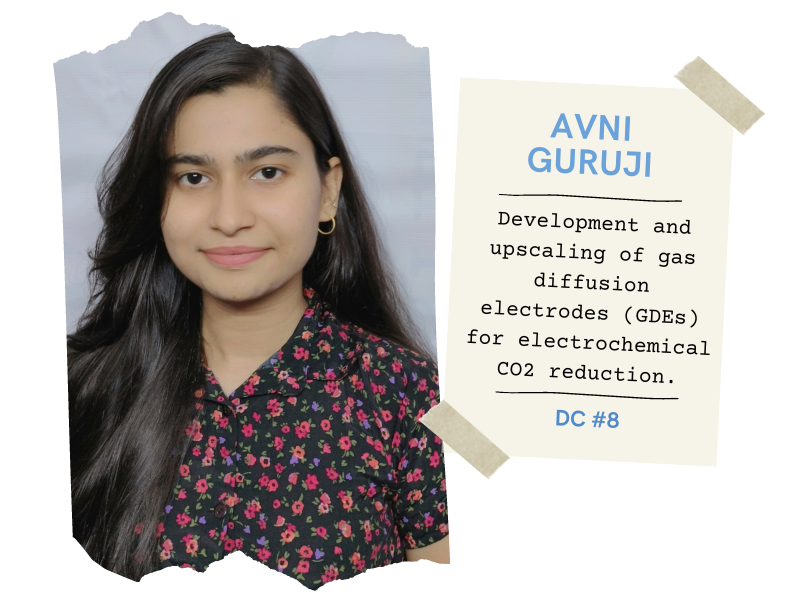
Born in Mumbai in 1999. Her academic journey commenced with a Bachelor’s degree in Chemistry from the University of Mumbai (2017-2020). Subsequently, in 2020, Avni worked as a Research Intern for 6 months at Cyanohealth Research Lab in Mumbai, where she explored the field of synthetic food colors. She pursued a Master’s degree from Savitribai Phule Pune University with a specialization in Inorganic Chemistry (2020-2023). During her master’s, she worked on synthesis, characterization, and applications of nickel selenide. Continuing her research pursuits, Avni joined Savitribai Phule Pune University as a project trainee. In this role, she dedicated her efforts to the development of hybrid metal chalcogenides, focusing on their potential applications in non-enzymatic urea conversion.

Development and upscaling of gas diffusion electrodes (GDEs) for electrochemical CO2 reduction
Project objectives: The electrochemical conversion of CO2 is a promising technology to overcome several challenges facing the implementation of carbon-neutral energy sources as it provides a means of storing renewable electricity in a convenient, high energy-density form. CO2 is considered as the furthermost thermodynamically stable oxidized state of carbon. Consequently, CO2 reductions using different approaches need high threshold energy input to overcome thermodynamic barriers. Thus, it is necessary to find suitable catalysts to boost the conversion kinetics and enhance the product selectivity. Advantages are observed when using electrochemical technologies for CO2 conversion from aqueous solutions, under relatively mild conditions, with limited consumption of chemicals, at controlled reaction rate and in an environmental friendly manner. In addition, a high selectivity in the desired molecule(s) produced will be achieved by controlling the processing parameters and interferences of undesired compounds, present in the CO2 waste stream, can be minimized. In order to develop an efficient CO2 conversion process, this PhD project will develop and characterize in detail Gas Diffusion Electrodes (GDEs) for selected bimetallic Cu/M catalysts for electrochemical CO2 reduction towards ethylene and further validate with other bimetallic catalysts for other products, e.g. CO, formate, methanol.
Working context: DC#8 will be hosted at the Flemish Institute for Technological Research – VITO (Belgium) and will be enrolled in the PhD school of the Trinity College Dublin (Ireland), supervised by Dr. D. Pant and co-Supervised by Prof. M. Garcia Melchor. Part of the activity will be carried on during secondment periods at APRIA for a training on electrolyzer development and testing the GDEs developed at VITO and at Trinity College Dublin for a training on electrode design and modelling.
Expected outcome:
- The DC will prepare a doctoral thesis in the field of electrochemical CO2 conversion, will publish scientific articles related to the research project of the assignment and will contribute to outreach and research at VITO and TCD under the framework of ECOMATES project.

